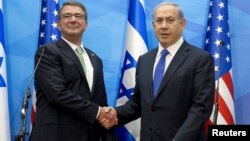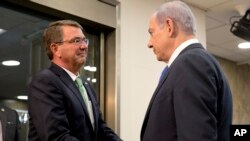U.S. Defense Secretary Ash Carter arrived in Amman, Jordan, late Tuesday, on a visit that is part of the Obama administration's efforts to convince skeptical allies in the region of the benefits of the Iran nuclear deal.
Carter's tour of the region includes Israel, Jordan and Saudi Arabia. Earlier Tuesday, he met with coalition troops in northern Jordan at an air base from where operations against targets in Syria are launched. The secretary praised the coalition service members, assuring them that "good always defeats evil," in reference to the fight against Islamic State.
He flew to Jordan from Israel, where he met with Prime Minister Benjamin Netanyahu to provide reassurances of continued U.S. security support following the Iran nuclear agreement. Netanyahu greeted Carter with a somber face before going into nearly two hours of talks at his office in Jerusalem.
Later, Carter said of the Netanyahu talks, "We don't agree on everything. And the prime minister made it quite clear that he disagreed with us with respect to the nuclear deal."
Israeli Deputy Foreign Minister Tzipi Hotovely indicated that Israel would maintain its opposition at least until the U.S. Congress completes its 60-day review of the accord.
"We must not think that our fight is pointless," Hotovely said. "We must continue to influence the Americans and prevent the lifting of sanctions."
Israeli counterpart
On Monday, Carter met with Israeli Defense Minister Moshe Ya’alon and told him, "Israel is the bedrock of American strategy in the Middle East.”
He said although the region was complicated and troubled, “We know what our interests are. And a principle among them for the United States is our friendship and alliance with Israel."
Ya’alon said Israel appreciated its relationship with the United States and believed that "despite all the differences, we share common interests and common values."
The two officials subsequently visited Israel’s northern border, where security concerns have been heightened because of the increased presence of heavily armed militants of Lebanon’s Hezbollah group, one of Iran’s allies in the region.
Carter is the first Cabinet-level U.S. official to visit Israel since Iran agreed one week ago to curb its nuclear weapons program in exchange for a partial lifting of economic sanctions against it.
Strained relations
Relations between the United States and Israeli governments have been strained by the agreement. Netanyahu criticized it as a “bad deal of historic proportions” and pledged to combat it through allies in the U.S. Congress.
Israeli politicians, including most of the opposition, also condemned the deal.
Many Israeli analysts criticized the deal, saying the U.S.-led Western powers "caved in" because of a lack of appetite for another war in the Middle East.
Other analysts, including many former military and intelligence officials, weighed in to say the deal was not that bad.
Amos Yadlin, director of Tel Aviv’s Institute for National Security Studies, called it "a highly problematic agreement that entails risks to Israel’s national security."
But, he added that comparing it to a "dream agreement" whereby Iran would stop enriching uranium was unrealistic.
"Had no agreement been reached," Yadlin said, "the infrastructure existing in 2013 [when the negotiations began] would have expanded even further to the point of immediate breakout capability, with no inspection regime in place."
Yadlin, however, said the agreement was far bleaker in the medium and long terms because it “legitimizes Iran’s status as a nuclear threshold state” and would eventually "entrench" this status "once Iran is permitted to operate an unlimited number of advanced centrifuges, resume unlimited 20 percent uranium enrichment, and engage in the reprocessing of plutonium."
This situation, he said, "will leave Iran with near zero breakout time to a bomb."
Lifting sanctions
Yadlin concluded that the lifting of international sanctions against Iran would "facilitate the influx of more than $100 billion to Iran" and even if most of the money were invested in the economy, "enough will be left to strengthen Iran’s conventional military forces, develop the Iranian defense industry and support the preservation of Bashar al-Assad’s murderous regime in Syria."
He concluded that Israel and its allies must prepare for the dangers when the sanctions are lifted and the restrictions on Iran’s nuclear program are ended.
And they must prepare, Yadlin said, "for the possibility of additional nuclear proliferation in the Middle East."
Yet, he cautioned against Israel intervening in the U.S. congressional review, saying, "The U.S. Congress is not an appropriate place … to intervene in a partisan struggle."
The former director of the Mossad intelligence service, Ephraim Halevy, put it more succinctly: "Don’t fight with America."
Carter visits Saudi Arabia on Wednesday.





